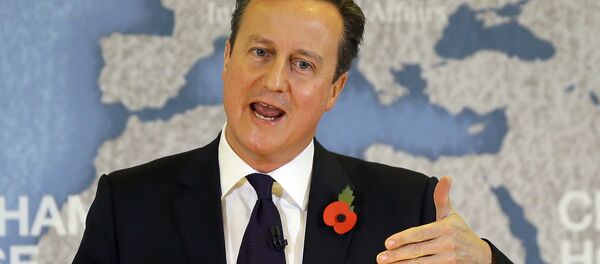The UK's Office for National Statistics (ONS) said the total of what people earned — including bonuses only rose by 3 percent between July and September this year. In September alone, wages only grew by 2 percent — which in financial figures is a sharp slowdown from the 3.2 percent in August.
Today’s record employment rate and rising wages show our economic plan is delivering security and opportunity for Britain’s working people.
— David Cameron (@David_Cameron) November 11, 2015
The number of people working in Britain rose by 177,000 taking the total employment rate in the UK to 73.7 percent — the highest since records began.
#Employment rate 73.7% for Jul-Sep 2015, highest since records began in 1971 https://t.co/Cx4CoquCVb pic.twitter.com/pW6dHUMoYK
— ONS (@ONS) November 11, 2015
ONS figures also reveal the number of EU migrants working in Britain increased by 324,000 to just over 2 million in the last year — also the highest since records began.
Overall, the number of people working in Britain over the last year has risen to 31.2 million, that is 419,000 more than a year ago. The European Union's unemployment rate is 5.3 percent.
#Unemployment rate 5.3% for Jul-Sep 2015, down from 6.0% a yr earlier and lowest since 2008 https://t.co/SSSV3UrXE2 pic.twitter.com/P8ot2FhxXF
— ONS (@ONS) November 11, 2015
Meanwhile, the UK's in or out of work numbers are fueling the debate over whether Britain will be better in or out of the European Union.
Figures from Oxford University's Migration Observatory reveal that that number of foreign born people working in the UK increased from 2.9 million to 6.6 million in 2014. The share of those employed in Britain grew from 3.5 percent in 1993 to 10.5 percent in 2014.
David Cameron recently stated: "I am not saying for one moment that Britain couldn't survive outside the European Union," adding that the UK was "the fifth largest economy in the world, the fastest growing economy in the G7 last year and the biggest destination for foreign investment in the EU."
However, in the same speech, Mr Cameron couldn't resist a swipe at the number of EU migrants living in Britain claiming benefits like tax credits.
"At any one time, around 40 percent of all recent European Economic Area migrants are supported by the UK benefits system with each family claiming on average around US$10,000 (£6,000) a year in work benefits alone and over 10,000 recently-arrived families claiming over US$15,000 (£10,000) a year.
"We need to restore a sense of fairness, and reduce this pull factor subsidised by the taxpayer."
But a reform to Britain's welfare system to stop migrants accessing it will also penalize British citizens accessing the same benefits, including tax credits. People working in Britain, whether they are born here or not and receive tax credits, do so because they are poorly paid. The credits are a government subsidy to top up low wages.
For Jul-Sep 2015 there were 31.21 million people in work and 1.75 million unemployed https://t.co/5tOxnFqv6B pic.twitter.com/4L5i6wC4yq
— ONS (@ONS) November 11, 2015
However, Tax credits have become a thorn in the Tory party's side. Chancellor George Osborne wanted to scrap them to help save US$18 million (£12bn) — and parliament agreed. But the House of Lords voted to stop the government from going ahead with the cull, citing fears it would push the poorest people living in Britain further into poverty.
And now former Prime Minister Gordon Brown is wading into the debate. The ex-Labour PM has called the cuts "frightening". Brown introduced working tax credits as chancellor in 2003 and says to cut them now, would hurt the working poor and "undermine everything Britain stands for."
For Jul-Sep 2015 wages up 3.0% on a year earlier including bonuses, & 2.5% excluding bonuses https://t.co/ujz2apLFKh pic.twitter.com/C8pmI6prQ6
— ONS (@ONS) November 11, 2015
Mr Brown also predicts that the number of children in poverty will "reach its highest peak" in 2020, if Osborne's tax credit reforms go through.
Unemployment figures may be falling — but with slow wage increases and anti-EU migrant benefit cuts looming, the gap between Britain's working poor — and those in work — is set to get even bigger.



